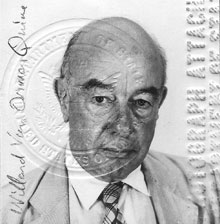
Quine
Willard Van Orman Quine (25 June 1908 – 25 Dec 2000) was one of the most important philosophers of the 20th century. He made major contributions to logic, philosophical logic, philosophy of language, epistemology, and philosophy of science. In his early years he was closely associated with Carnap, whom he visited in Prague in 1932, but in ‘Two Dogmas of Empiricism’ (1949), one of the most influential philosophical papers of the post-war period, he repudiated the analytic-synthetic distinction and thereby much of logical empiricist philosophy of science.
Echoing Wittgenstein’s mature philosophy, he subsequently extended his criticisms of the notion of analyticity and ‘meaning analysis’ in philosophy of science to mentalism tout court, rejecting the idea that words correspond to mental items, their ‘meanings’, insisting instead that there is no more to the understanding of a language than what can be gleaned from observable verbal behaviour. Here, as elsewhere in his philosophy, Quine relied heavily on the doctrine of the underdetermination of theory by evidence.
By the late 1960s he had come to defend a still more contentious claim: that with the failure of Carnap’s project in the Aufbau and related rational reconstructions of scientific theories and knowledge claims, there was no longer a point to purely philosophical (‘foundational’) epistemology. Epistemologists should make use of science in the examination of knowledge claims, rather than provide a foundation for such claims, what he called the ‘naturalization’ of epistemology.
Quine’s philosophy had many influences, nominalism, empiricism, and the tradition of American pragmatism among them. In ‘On What There Is’ (1948), one of the cornerstones of his philosophy, he insisted that the use of quantification theory was the key to ontological commitment, and that insofar as quantification over abstract entities and unobservable objects was unavoidable in the sciences, so too was realism. But he denied that science must make use of modal idioms and maintained a nominalist view of properties, propositions, and intensions.
Quine grew up in Akron, Ohio, and completed his degree at Oberlin College in 1930. He was awarded a PhD from Harvard University in 1932 for a dissertation that reworked Principia Mathematica, by Russell and Whitehead, dispensing with the ramified theory of types. His advisor was Alfred North Whitehead. He was appointed to the Society of Fellows shortly after. He was associated with Harvard for the rest of his life, and held the Edgar Pierce Chair of Philosophy at Harvard from1956 to his retirement in 1978.
Links
W. V. Quine: ‘On What There Is’ (1948) >
W. V. Quine: ‘Two Dogmas of Empiricsm’ (1951) >
Wikipedia: Willard Van Orman Quine >
Stanford Encyclopedia of Philosophy: Quine >
Stanford Encyclopedia of Philosophy: The under-determination of scientific theory >
Stanford Encyclopedia of Philosophy: Naturalized epistemology >
The Internet Encyclopedia of Philosophy: Quine’s Philosophy of Science >
Multimedia
The Fogelin Panel: In Conversation with W.V. Quine >
IN out TIME >
